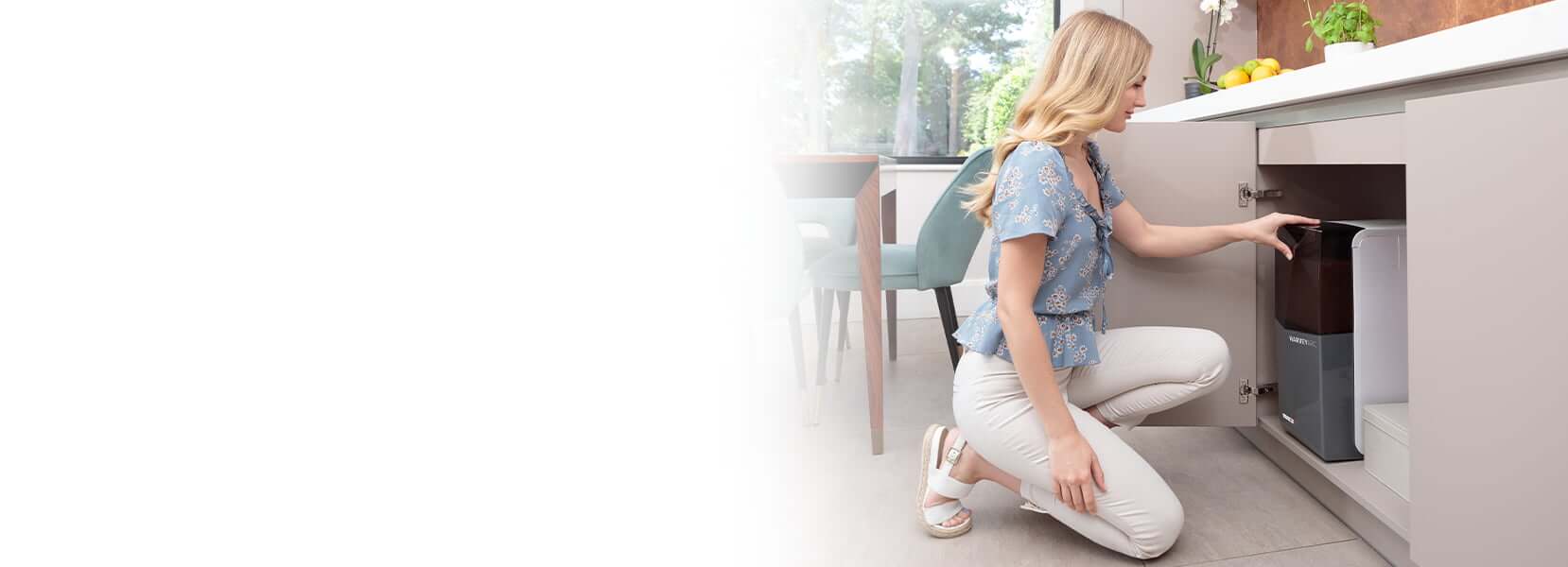
Our Guide to Buying a Water Softener
Rainfall is formed of naturally soft water. However, due to our climate and the geological composition of our landscape, hard water is widespread across the UK.
This can lead to problems such as ineffectual cleaning and the build-up of limescale, which can cause damage to plumbing and water heating systems as well as looking unsightly.
Things to know before buying a water softener
At Harvey™ Water Softeners, we have over 40 years of experience in building the very best water softening technology. We have created this comprehensive water softener buying guide to provide you with more information about hard and softened water.
The following are some key things you should know before buying a water softener, and will be covered for you in this guide. If you do have any more questions, you can get in touch with our team or book a free, no obligation demo where a qualified technician will visit your home and talk you through how the softener will work for you.
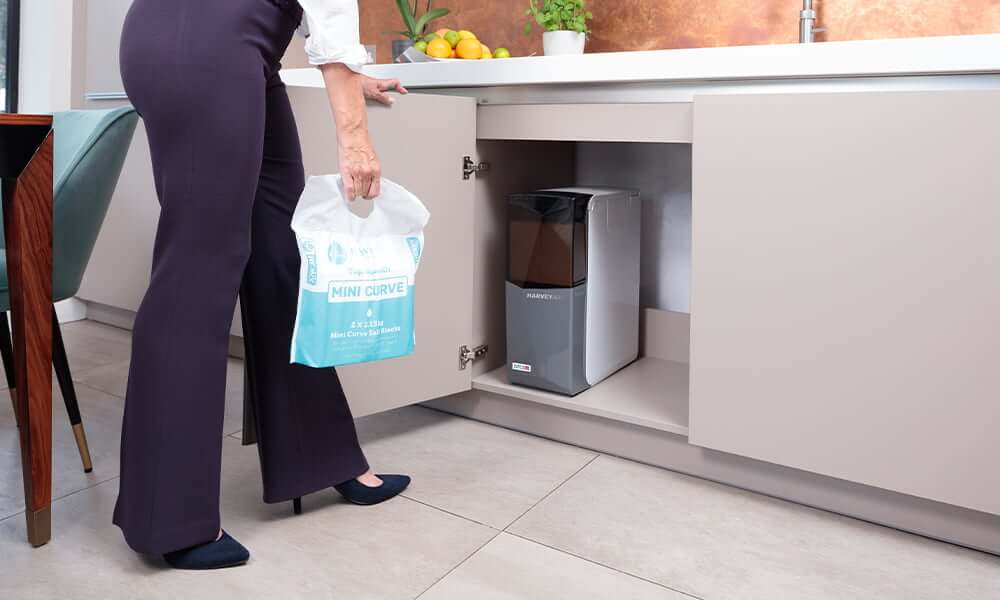
What is a water softener?
A water softener is a device which connects to your plumbing system at an easy access point, like underneath a kitchen sink. It removes the calcium and magnesium minerals found in hard water to convert it into soft water. Using a water softener allows you to avoid many of the problems caused by using hard water.
Water softeners work using a process called ion exchange, in which calcium and magnesium ions from hard water are exchanged with sodium chloride (salt) via a special resin. The water goes into a pressure vessel where it moves through the resin beads, and the calcium and magnesium are replaced by sodium. These calcium and magnesium ions are then removed in regeneration cycles, leaving behind only soft water.

How do I find the perfect Water Softener?
The perfect water softener for your home will depend on many different factors. Here are some of the things you’ll want to take into account:
How often does my water usage change?
For example, do you have family that come to stay, or do you often go away at weekends?
How much water do I use?
Do you have a large family, or do you often find that everyone in the household needs to use water at the same time of day?
What sort of plumbing do I have?
A system with large pipes will need a water softener that can process water more quickly. A system with tanks in the loft will have a more constant pressure, whereas a system with a mains water supply that enters through the garage will need a different installation plan.
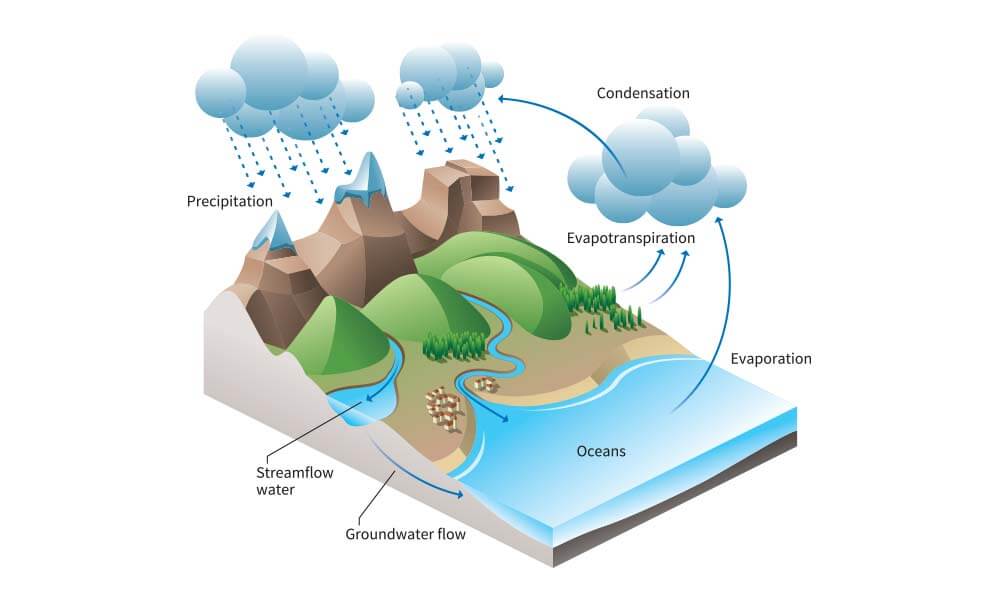
What is hard water?
Hard water is water which contains a high volume of mineral ions due to how the water has travelled through the Earth. Hard water contains magnesium and calcium minerals, which makes it hard to form a soap lather. This can often make water seem cloudy and is responsible for causing limescale to form. Soft water, on the other hand, contains little or no dissolved calcium or magnesium and forms a soap lather much more easily. As no salts are present, soft water does not contribute to the formation of limescale. This is the main difference between hard water and soft water.
What are the effects of hard water?
The negative effects of hard water come in the deposition of scale and scum. You may be familiar with the telltale signs. Tidemarks around baths and basins, unsightly white marks on sinks, toilet bowls, and shower heads. In worst case scenarios, the build-up of this material can create blockages in pipework and lead to the premature failure of water heaters.
Due to its composition, hard water can result in a less than effective wash. Its rich mineral makeup prohibits an effective reaction with soap. This basically means that it is harder to create lather, foam, and bubbles, resulting in a less than effective clean. Clothes can be left grey and dingy, whilst dishes and glasses can appear dull and smeared. It can really affect the longevity of your clothes and kitchen appliances.
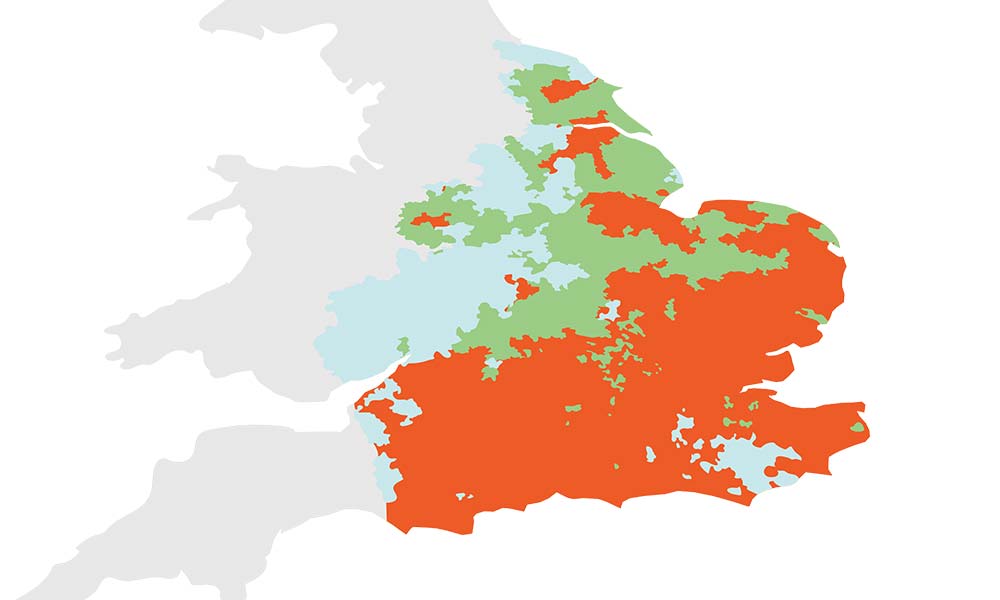
Is my water hard or soft?
Hard water is widespread across the entire UK, though some places have a richer composition than others.
To give you a better sense of the distribution of water composition in the UK, this map provides a more accurate overview.
As you can see, Wales and both North West and South West regions have the softest water, whilst most of the UK is host to hard water. It should also be noted that Northern Ireland and Scotland are naturally soft. You can also use our handy postcode tool to find out the exact hardness of the water in your area.
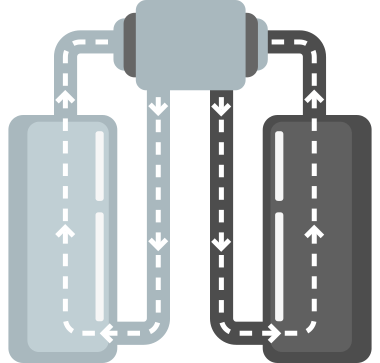
How does a water softener work?
Water softeners work using a process called ion exchange, in which calcium and magnesium ions from hard water are exchanged with sodium chloride (salt) via a special resin. The water goes into a pressure vessel where it moves through the resin beads, and the calcium and magnesium are replaced by sodium. These calcium and magnesium ions are then removed in regeneration cycles, leaving behind only soft water.
The Benefits of a Water Softener
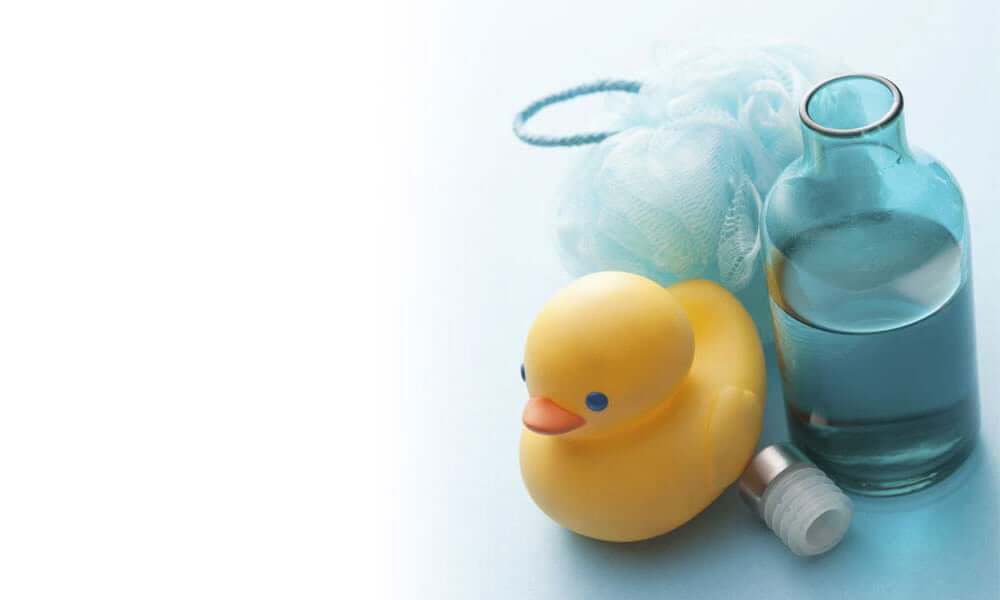
Fewer products
Creating more lather means you use less soap, saving you money!

Soft on skin
Enjoy water that is soft to touch, leaving you with luxurious water to bathe in.

Less time cleaning
No scum marks mean your cleaning time will be reduced.

Cheaper bills
Pipes will scale over time and your hot water system will become more efficient.
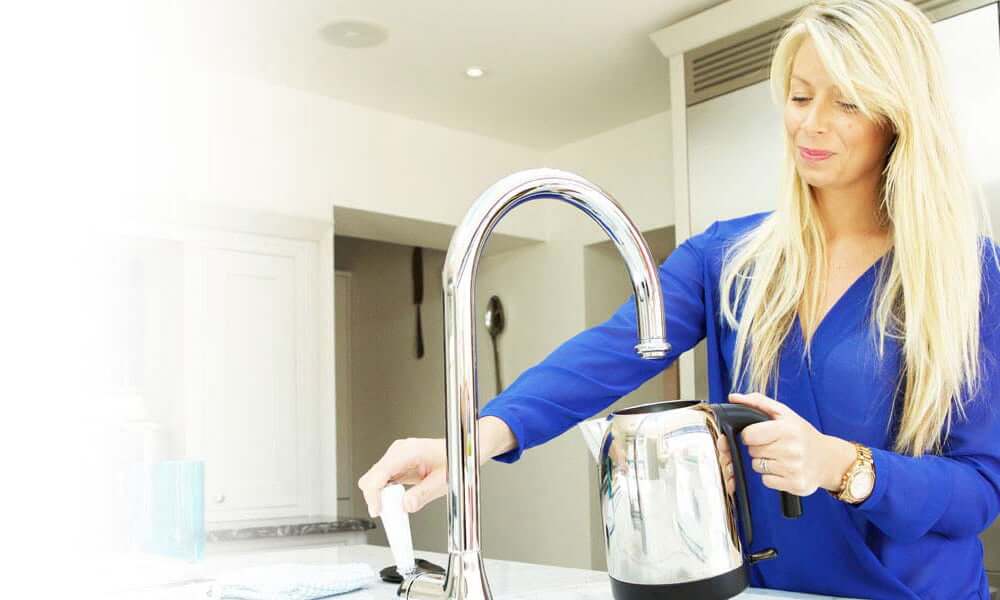
Appliances last longer
With softened water scale will slowly diminish, extending the lifespan of appliances.
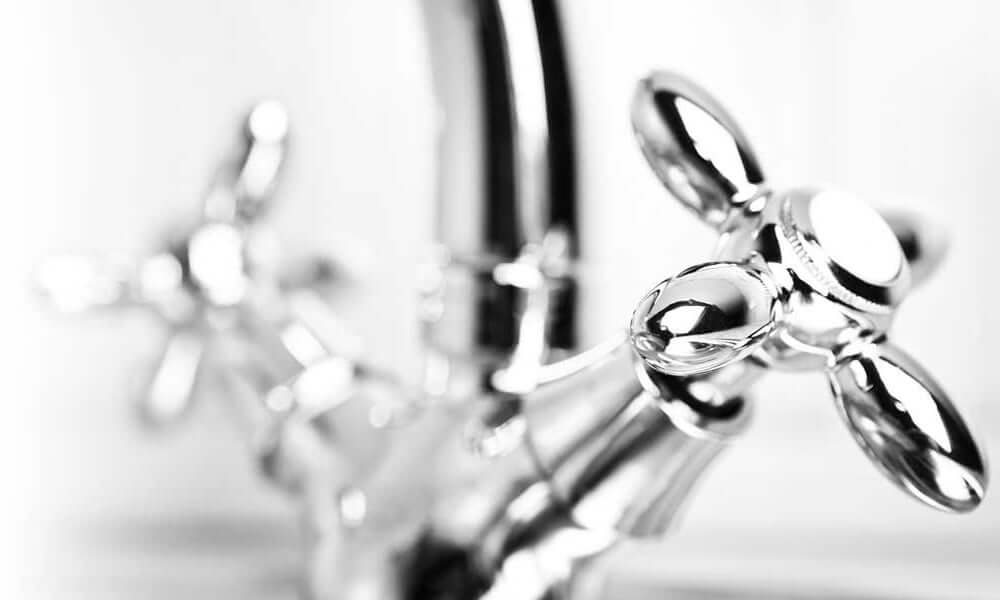
Shinier home
No more limescale residue on your shiny surfaces.
Types of water softener
Single cylinder or Twin cylinder?
Water softeners typically come in either single cylinder or twin cylinder varieties. When you require a large amount of soft water, perhaps for a big wash after a family meal, you will find the single cylinder system struggles to keep up with demand. Water softeners rely on a two-stage process involving the separation of the calcium and magnesium ions followed by their removal through the regeneration process. When single cylinder systems are forced to treat large amounts of water, the regeneration cycle has trouble keeping up.
Usually, the regeneration cycle is triggered by an electrical timer, which regenerates the system when it is not typically in use (during the night or the working day for example). The result is that hard water will flow from your taps and the regeneration cycle may take 4-5 days to complete and it will waste water and salt in the process. Twin cylinder water softeners work off pressure and can regenerate continuously.
Learn more about single vs twin cylinder water softeners
Electric or Non-Electric?
Electric water softeners (or electronic water softeners) use an electric timer. At a set time, usually once a day, the timer tells the water softener to flush the resin bed with water and salt, so it can continue softening water. This means that at times the resin bed is cleansed before it’s necessary, therefore wasting both salt and water.
Some makes of electric water softener come with just a single tank, this works fine until the time comes for it to regenerate. It can take some time to complete the process – during that period there’s no output of softened water, so you will have a proportion of hard water running through your system. The Harvey dual cylinder system maintains the softened water supply 24/7 because when one cylinder is regenerating, the other continues softening.
Non-electric water softener systems, like Harvey models, work on a geared, throughflow model rather than an electric timer. The water displacement meter in a Harvey water softener has been developed so that it only triggers the cleansing process when enough water has passed through it to make cleaning necessary. This means that the water softener only regenerates when it needs to – avoiding salt and water wastage and thus saving money.
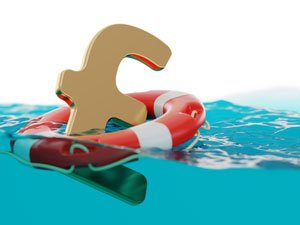
How much does a water softener cost?
The cost of your Harvey™ Water Softener will vary according to the type and size you choose. However, the savings provided by a water softener can produce a payback within at little as 2 – 4 years. We also regularly receive feedback from our customers that the benefits they experience from using soft water more than justified their decision to invest in a water softener.
We can provide you with a free quote for a water softener, and we also offer a lot of flexibility in regards to payment options available or if you’d simply like to have a no-obligation demonstration.
Does my water softener need servicing?
Our water softeners don’t need any servicing. We’ve designed them with easy maintenance and ownership in mind. To keep them running efficiently and performing to their best, all you need to do is keep them topped up with salt. This isn’t typical of all water softeners, so we do recommend that if you’re comparing makes and models that you take maintenance and ... Read More >
What if I move home?
A Harvey water softener can be easily removed and refitted in any home, whether it’s a house, bungalow, flat or apartment. It’s possible to move it and reinstall it yourself. We can also move it for you, or you could ask your removals company or a plumber to quote for moving a water softener if you need any specialist help. Before you move There are some ... Read More >
Why is a Harvey Water Softener™ better than an alternative product?
What makes a Harvey Water Softener so special? As the leading UK brand of domestic water softeners, we’re incredibly proud of the exceptional quality and design of our Made in Britain machines (in recognition of our efforts to promote excellence in research and development for British manufacturing). We have decades of experience developing the best ... Read More >
How much does a Harvey Water Softener™ cost?
The cost of installing and running a water softener can vary depending on a number of factors, including the plumbing systems in your home, how many people are in your household and your water usage. We always get our professional demonstrators to assess your home and provide you with a quote that’s specific to your home and your needs. They can ... Read More >
Is softened water safe to drink?
Softened water is considered safe to drink in the majority of cases. How can water that contains salt be safe to drink? Softened water is safe to drink. There are a few precautionary exceptions but it’s a mainly a matter of preference whether you choose to drink it. Many people choose to have a drinking water tap installed at ... Read More >
What boiler and system do I need to use a water softener?
Our water softeners are designed and manufactured in England to suit UK homes and plumbing systems. Most boilers, central heating and water systems will benefit from using softened water, which can help systems run more efficiently by flushing away scale and scum. These are some of the most common types of system. A Harvey water softener demonstrator ... Read More >
Can I use softened water in my garden?
You can use softened water for gardens, but it might be advisable to limit the amount. In the UK, an increase in sodium in the soil is unlikely to cause a problem for plants, because of the amount of natural rainfall we get to dilute it. As long as your garden and pots are well drained, there should not be any significant sodium build-up. ... Read More >
Can I use softened water in my aquarium?
Some types of fish, particularly tropical and exotic fish, require special water conditions. Before filling a fish tank with softened water, we advise checking with your specialist provider. If you keep fish in an indoor aquarium or outdoor pond, check with the aquatics store where you bought them, or consult a vet or aquaculture expert. Softened water may not ... Read More >
